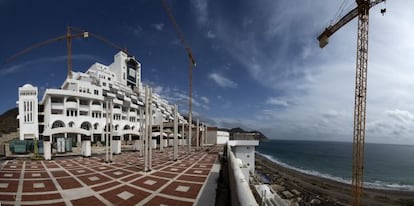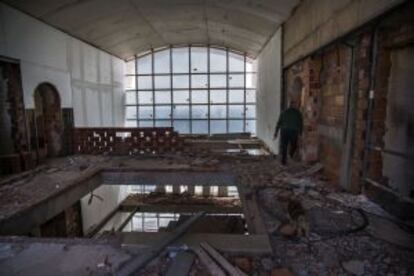Halted Almería tourist complex could yet be completed after court ruling
A symbol of the destruction of Spain’s coast for some, the Algarrobico hotel was set for demolition

When in 2006 a court in Almería called a halt to work on the Hotel Algarrobico, located on a beach in a protected area of the Andalusian province, environmentalists celebrated what they thought would be the imminent demolition of the 21-story, 414-room complex that had come to symbolize a decade-long construction boom that saw property companies and local governments throughout the country flout zoning planning rules with impunity.
Since then, governments, local, regional and national, have come and gone and there have been appeals and counter appeals lodged, moving up from one court to another, until last week, when the Andalusia regional High Court (TSJA) unexpectedly ruled that in fact the hotel was built legally.
In short, the TSJA has accepted an appeal made by the hotel’s developer, a company called Azata, and the local council arguing that the hotel is in fact on land zoned for construction, based on the fact that the project was planned in the days before the area was declared a protected natural park, meaning the land on which it was constructed was allowed to be built on.
In fact, work continued on the hotel for two years after the 2006 ruling, with the support of the Andalusian regional government. At one point the administration produced a zoning map that had been redrawn with a ballpoint pen, which one judge described as a “crude maneuver”.
Now it seems national laws protecting Spain’s coasts and declaring the area a natural park do not apply
Now, it seems, national legislation protecting Spain’s coasts and declaring the area a natural park does not apply.
A good place to begin understanding the twists and turns of this story is at the office of José Rodríguez, the deputy director of Azata, the hotel’s developer, which is located in a former palace in the center of Madrid, atop which flutters the company’s flag.
The company started out in the suburbs of Madrid, where it has been involved in several controversial projects, such as the development of woodland in the wealthy satellite town of Boadilla, to the northwest of the capital. The Rodríguez family soon set its sights on building holiday homes in Almería. In 1999, it bought beachfront land close to where part of Lawrence of Arabia was filmed in the early 1960s. The Algarrobico project was designed with international tour operators in mind, and would be divided into seven independent modules.
“Expectations have been generated about the demolition of the hotel that are not supported by the law,” points out Rodríguez. “When we bought the land we were told that it could be built on. We acted in good faith, believing that the local government was acting within the law. It is not acceptable for somebody else to come along later and say that the rules have changed.”
When we bought the land we were told that it could be built on. We acted in good faith”
Azata has so far not said whether it will resume work on the hotel, or will demand compensation. The company says that if the criteria required for building a hotel change, then the government has to assume the costs involved: “The idea now is that the parkland needs protecting more than when we were given building permits. That’s fine, but the regional and national governments have to bear the financial costs involved.” Asked if the sudden appearance of the vast, whitewashed complex in virgin parkland might have triggered alarm, Rodríguez says that painting it white might not have been the best approach. “It’s not that big. The white really does clash with the landscape. We wanted to color it ochre, but local rules prevailed. We also had a vertical garden planned that would have helped it blend in more with its surroundings,” he adds.
Jose Ignacio Domínguez, a lawyer who works for environmental group Ecologistas en Acción, says the latest court ruling is a “trampoline” that will legitimate the upcoming legalization of the hotel. He says that ruling will most likely approve the 10th to 21st floors, requiring the removal of the remaining nine floors within 100 meters of the beach, which include a number of swimming pools and are in breach of the Coast Law of 1988, the year that the first planning applications were made. A 2012 Supreme Court ruling has already ordered their demolition. In other words, the bulk of the hotel would be deemed legal. Which would then likely set off another round of court hearings and appeals: should only part of the hotel be knocked down, compensating the constructors accordingly, or should the whole thing be knocked down?
And while environmental groups may have garnered support in the rest of the country, in Carboneras, the nearest town, local people support it. Carboneras has certainly seen its share of construction of second homes over the last two decades, but retains much of the peace and quiet that attract visitors, and is far from a case study in illegal or poorly planned construction.
Around three quarters of Carboneras is protected land, meaning that there are few opportunities for agriculture, for example. A third of its population of 8,000 is without work. Employment is provided by a power station, a cement factory, a desalination plant, and fishing. There seems little activity in the latter sector most of time.

Salvador Hernández, of local independent party Gicar, has been mayor of Carboneras for the last two years. He sees the hotel as a necessary evil, and says he was surprised at the latest court ruling. “After so many years, we had given up. The place isn’t going to generate a thousand jobs, maybe 80, which for a half-built property isn’t bad. As to whether it is ugly or not, I have my opinions, and I would have preferred something a little more compact, but what we now have to see is whether all this can finally be made legal.”
Hernández inherited Algarrobico from his Socialist Party predecessor, Cristóbal Fernández, who had been mayor for almost three decades. Charismatic and controversial, Fernández oversaw the incorporation of the community into the natural park, was pardoned by the government for electoral shenanigans, and has been first enemy, and then friend, of Cristina Narbona, the Socialist Party environment minister when the hotel affair blew up. His nephew has since taken over as the party’s spokesman in the town council.
“The government in Madrid talks to the regional government about who is going to blow the hotel up, but they don’t consult us,” says the mayor about the ongoing talks between the national PP administration and the Socialist Party-led Andalusian regional government about who will pay for the cost of demolition. “We’re just the Indians on the reservations, we have no say in matters,” he says.
Hernández points out that the regional government originally supported the hotel project: after all, his predecessor belonged to the Socialist Party. Another reason is that the regional government wanted to encourage tourism in the area, and was prepared to interpret the law liberally by supporting hotel infrastructure. “The problem is that they didn’t really understand the scale of what Azata had in mind; also, the promoters played fast and loose with the law,” says a source in the town council. “The regional government believed that this would bring in tourists, but when they saw what was being built, and the public outcry, they couldn’t back it any longer.”
It’s not the size, it’s the sheer whiteness of it”
A visit to the beach where the hotel is located certainly leaves the words of Azata’s deputy director open to interpretation: “It’s not that big.” Turning a corner along the rocky coastline, a pyramid that could give Machu Picchu a run for its money emerges. The beach doesn’t so much bring to mind Lawrence of Arabia as the final scene of Planet of the Apes and Charlton Heston standing amid the last vestiges of Western civilization.
It turns out that the hotel entrance is not on the beach itself, but around 40 meters away from the shoreline along a road. Neither is it anywhere near to completion, as Azata claims. It appears that a lot of the work has been carried out too quickly, and there are mismatches and distortions everywhere.
Miguel García was the site manager on February 21, 2006, when construction was halted and the workforce of 234 sent home. He now works as the complex’s sole security guard. Walking through the empty rooms, lighting one cigarette after another, all he can seem to say is: “What a shame, what a pity!” He skips up a marble staircase to the dome. There are piles of rubble everywhere, some having sprouted prickly pear trees over the intervening years. The kitchen has been looted, and all cabling stripped. The four cranes on the site are slowly being eaten away by rust. “You should see them on windy days, they swing round like crazy,” he says. His hope is that the hotel will be completed: “and I can enjoy a beer on the terrace.” He also raises the question of what would take the hotel’s place if it is demolished: “We got rid of the equivalent of 12 storys of mountainside to build this.” And like Azata’s Rodríguez, he agrees that white was not the ideal color to paint the complex: “It’s not the size, it’s the sheer whiteness of it.”
The mountains rise up behind Algarrobico; last month’s court ruling allows for construction there, too. The environmentalists say this is a key part of the question: “The developers wanted to build golf courses and seven hotels up there, but we didn’t want to,” says a source at the local council. “We’ll support them in order to finish the hotel, which is now half finished, but we’ll have to see about the rest.”
The future of Algarrobico is still uncertain, and there will be more court cases. This is a problem that is going to take much more than a lick of paint to sort out.







































